Should You Charge For Your Knowledge? A Defense For The Creator
The advent of the internet changed the way we fundamentally organize and conduct ourselves both as a business and a society. This fundamental shift gave us a new definition of value. The new definition of value motivated Kevin Kelly in 2008 to write a 6,000 words (estimate) essay, 1,000 True Fans. The essay became a template for the knowledge workers to monetize their knowledge.
In the essay, Kevin argued that all that a creator needs to make a good and sustainable living is 1,000 true fans who are ready to pay him/her an average of $100 per year. He argued with an income of $100,000 (1000 * $100), anyone would be fine financially. Stressing the point that you don’t need to build a product that will be used by billions of people or even millions. In so doing, he provided a reasonable expectation for all creators.
In the intervening years between 2008 and now, 100s of companies have been created with a combined value of more than $300 Billion (back of the hand calculation). All working to make sure that the creators that Kevin talked about can properly capture value at different levels of their content life cycle.

Because of all these tools, creators like Ben Thompson, Packy McCormick, Li Jin, David Perell and countless names have been able to make a living from their work/creation. How? By charging their (1,000 true) fans some amount of money for what they create for them.
Innovation to help creators have not slowed down. In recent months, we’ve seen a new level of products and features, from NFTs to Tip Jar. Society is still looking for ways to help the creator monetize their work. And the data so far confirms that the world welcomes this and that we are in for a long haul on this trajectory. Li Jin is at the forefront of this. Read her thoughts here.
As the world moves towards this trajectory, wo/men of my country (Nigeria) are also not left behind. We are also innovating and looking for ways to help the creators’ capture value from their work. Out of that effort, we have Disha that provides a basic website to help creators showcase their work on a one-page website. We also have Publiseer, a distribution and monetization platform for creators. That’s just to name a few, we have more.
However, it appears that within all these, some people don’t want these creators to get paid. Forgive my seemingly early conclusion on this, as I’ve said, this is an attempt in defence of creators to charge for their work.
A common trend
It appears that often on the internet (social media) when someone puts out that they are charging for their knowledge, there’s always someone somewhere who will question them of charging. The argument always goes, “if you are making that much money from your hustle, why would you care to charge others to learn the same thing?” Thereby positing that everyone should give out their knowledge for free. Since an average person is in a way expected to have made money off their knowledge that is independent of teaching others.
The logic, when first assessed may appeal to you. However, it doesn’t add up. Also, it is counter to the direction in which the world is headed, a more inclusive, value-added and creator-paid one.
This argument surfaced on Twitter again today.
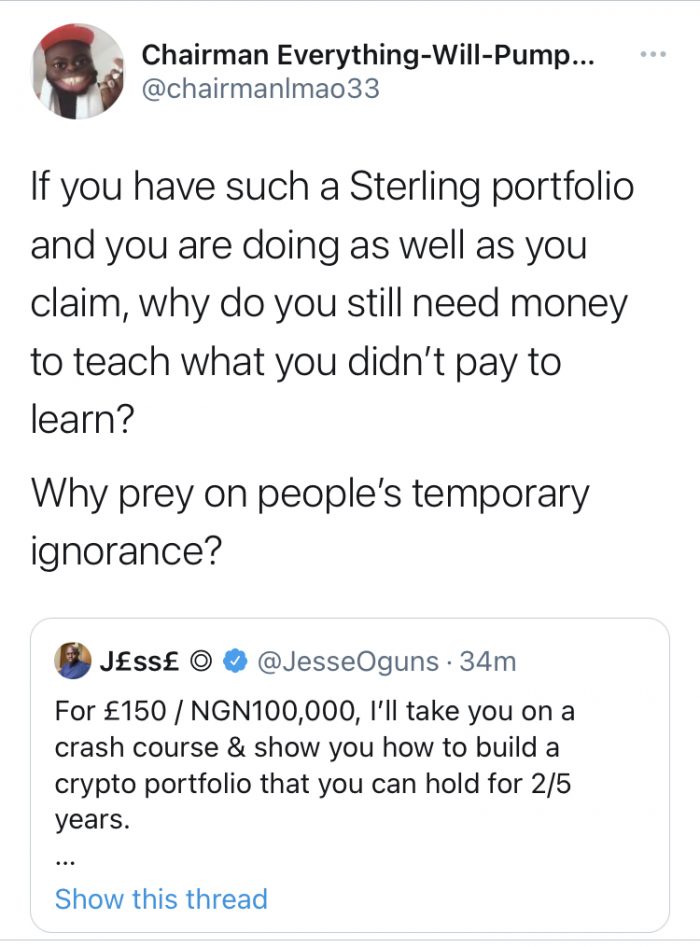
Taking on the issues one after the other:
Freely have you received, freely should you give
One of the common arguments is that since you got it for free, you should also give it for free. While that is logical, there is no binding law to support it. It’s left to the individual who got it to choose if they would give it for free or not.
Of course, inferred from that argument is that if you paid to receive, it is also only fair to charge for it. Again, there is no binding law about that. Although you might have paid, you are free to give it out for free if you so wish.
Creators – people who create content, are free to decide if they want to make money from their knowledge or not. As long as they are not forcing anyone to pay. That’s what I think. But that quickly takes me to the next issue.
The knowledge is freely available “online”. Why should you charge for it? You are preying on people’s ignorance
A few years ago, I discovered the browser newsletter. I subscribed immediately because I liked the content. Then The Browser introduced a paid plan, I didn’t have the money to pay, so I didn’t pay. But what does that have to do with this point you wonder?
The browser doesn’t create any new knowledge. It simply curates the best articles around the internet and delivers them to their subscribers’ email. They charge $5/month for information that is absolutely freely available on the internet.

And I’ve not seen anyone person come out calling the folks at The Browser a charlatan or a fraud. And even if they did, Paul Graham’s counsel will fit in here well.
“Don’t pay attention to the mainstream’s opinion of what you’re doing—whether it’s your skills, your idea or whatever. Unless they’re your users, their opinion doesn’t matter. (Pay a lot of attention to your users’ opinions though!)” Paul Graham also highlighted the quote from an article by Jessica Livingstone, his partner at YC and wife.
Even if the Browser teams had faced similar criticism as folks from Nigeria may be facing, then I will assume they’ve heeded Paul’s highlight. They have overlooked the mainstream opinions and prioritize the opinions of their paying users.
You should get where I’m headed with my pint by now. The simple argument that the resources to learn a skill or craft is freely available on the internet therefore no one should charge for it is flawed. Note that even the so-called freely available have what they are optimizing for. Sometimes they want to build something that can be monetized out of the freely available.
Even beyond creators’ desire to monetize, others are building tools to enable the monetization as well. Simply, society is telling them we value your work and would like to pay for it. That’s what Patreon and Tip Jar are meant for, to help monetize those free information.
As I noted in this thread, the internet has expanded the definition of value and we need to come to that reality. Yes, the information is freely available on the internet but anyone that can help filter through the sea of information is creating value and should be allowed to get paid for such value creation. It’s fine if you don’t want to pay. 7 billion people exist on this green planet and creators only need “1,000 true fans” to get enough for their sustenance.
But is it preying on people’s ignorance? Let’s explore that.
I belong to Chris Ani’s CryptoHub community. To gain access to the community, he will give you access to a course on crypto he created. The course is so loaded with a lot of information that after completing it, you will be good to start your journey. And to access the course you have to pay.
Here’s the interesting twist, folks who paid for the well-curated course will still come to the group and ask the most basic questions. Signalling they have not taken the course. Of course, the community is friendly enough. So there will always be at least one person that will not only answer such questions but will also point them back to a section of the course that answered their question already.
Now, that’s someone who paid for a course to move from being ignorant to being enlightened. Yet, they refuse to sap in the knowledge. How much more someone that has been left to wonder in the sea of information that is Crypto?
My point here is that it is not as black and white as some may think. Why did I pay for the course myself? I wanted the upside in the crypto economy but don’t have the luxury of time to research it. And I am not the type that takes decisions just becomes some random person on Twitter or YouTube said: “buy this or that”. Chris and his team appear to me to have a track record that I can trust and that’s it.
So it is never about preying on people’s ignorance. Even the best of us knows that we struggle to do what we know to be best for us.
Well, this point will again lead to the next.
Do we have different kinds of knowledge?
One of the responses to the discussion today posited that if the creator had compiled the content, made it a course, and chosen to charge for it, that would have been a different story. I found that argument not well thought out as well.
And that’s why I asked if we have different kinds of knowledge – one that can be charged for and the other that cannot. Since the argument here is hinged on the mode of delivery.
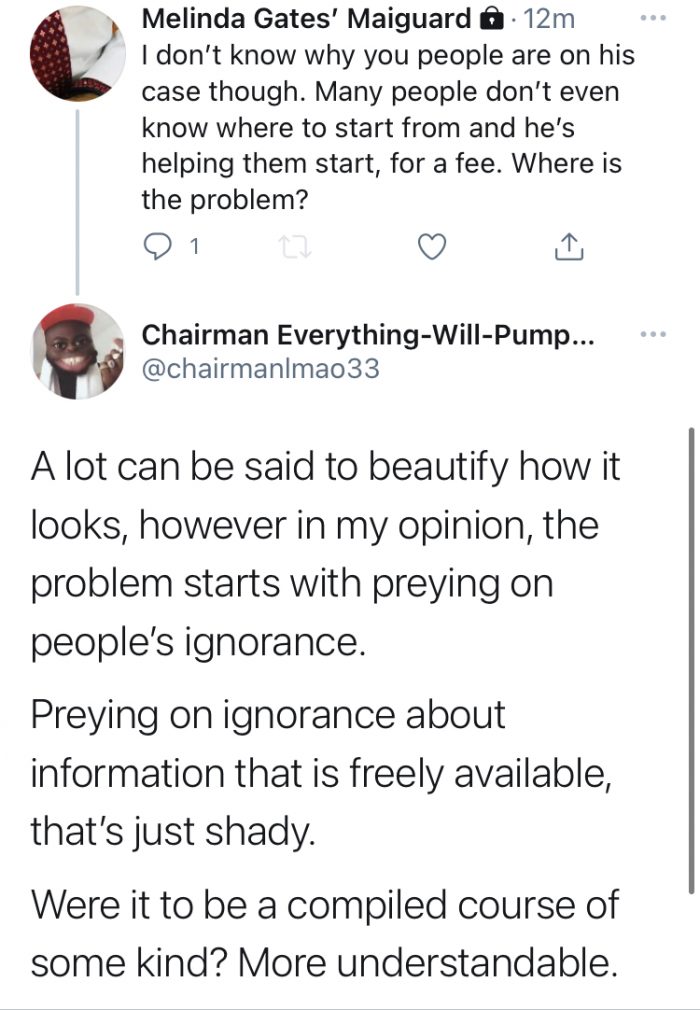
Globally, the model of creating a course (or ebooks) and making it self-paced is facing a lot of challenges. Massive Online Open Courses (MOOCs) are at the forefront of this. They brought the education from the world’s best universities and individuals to us for a token, yet only a paltry 10% of us bother to complete the courses. MOOCs may be a far-fetched example. If I ask Chris to send me the percentage of completion on his crypto course, I doubt if it will be any better completion rate. Does that then mean we can’t have education just because we can’t complete self-paced courses? No!
That’s why a new model is being invented and it appears to be working much better than the self-paced model. A variant of this new model is what Jesse is adopting that got him a lot of criticism today.
It’s called the cohort-based education model. Read Gad’s explainer article to understand it. In summary, it is about admitting just a few people per time, bringing them together under a common course and helping them to learn new knowledge with a set date of completion.
A lot is unique about the model but they aren’t important for this article. What’s important is that this model has proven to be more effective than the self-paced modules.
My bad, I have also added to the statistics. I have started a lot of courses that I didn’t complete. Including the CryptoHub course. But you know what, I’ve attended one cohort-based course with Professor Galloway, and it is my best online course so far. And recently, I have another one I will be attending with the On Deck team. Well, maybe I digressed.
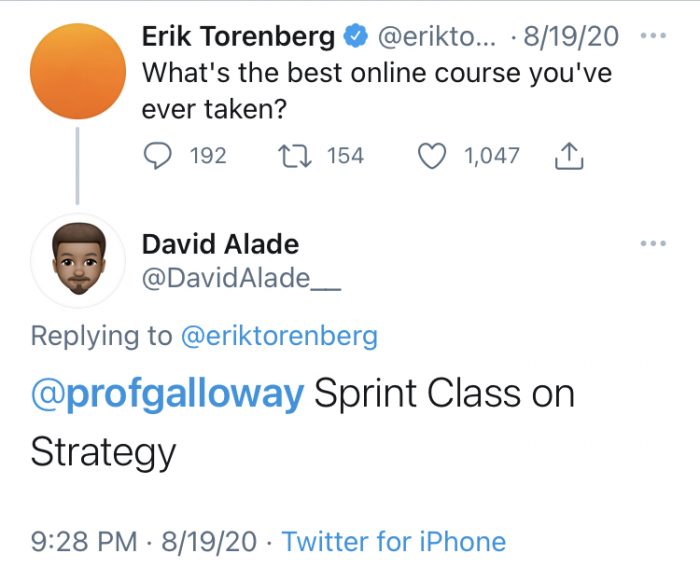
So the argument that a form of knowledge is worth charging for and another is not worth charging for doesn’t hold much water. What is worth charging for can only be determined by those who paid for it. And even that is only a necessary condition, not a sufficient one.
I attended an Advanced Excel training once and after the class, I had to call the coordinator that I didn’t learn anything new, yet they called it an advanced training. I was so angry with myself that I’d paid that much to learn nothing. But we moved on. While we were in class though, other participants were so happy with the training and believed they’ve gotten value for their money. When I lodged my complaints they were just looking at me.
In that, I pick an important lesson, especially for the creator. Your student may not find new knowledge from you, offer them a refund. Have a refund policy expressly stated. And also, make your course content known to all to avoid non-alignment of expectations.
I had to bring this point up because even if a customer (not a fan) of the creator had come on Twitter to say they didn’t get any value, just like I didn’t get, that won’t still be enough to cancel someone’s hustle. I didn’t learn anything new in my excel class but others learnt. Refunds will solve this problem.
And creators who believe themselves to be offering value should not be afraid to offer refunds. I can’t find the statistics now, but I know very few people (less than 5%) claim refunds. Not because they don’t want to, but because they did get value. My Excel guy then is still in his business helping others. I was just an exception to the rule, not the norm. He also called to apologize.
Knowledge is not different. Any form of it can have a price tag. And all the free available information is also optimizing for something. My Website is free and a lot of people have been helped by it. That doesn’t mean I don’t want to or can’t charge for it. And I know all my active readers won’t pay if I choose to charge. But who said I need everyone on earth to pay me? I only need my 1,000 true fans and I’m good to go.
Should you pay someone for their knowledge?
This is another interesting point and it is not difficult to answer. Ambiguity however comes when you want to impose your judgment on others.
What do I mean? Should you pay someone for their knowledge is highly dependent on you. Do you trust the person enough to give you what you are paying him for? If so, then go ahead and pay if you can afford it. Otherwise, wait until you find someone else or go to where the free resources are and get your knowledge from there. Dr Ola Brown once shared a YouTube University content. I am sure only a few utilized it.
The ambiguity comes when you think because you can’t pay someone, others should not also pay or those who are paying are foolish or lazy to be doing so. You stand on a high moral ground if you see it that way. We are not really good at being such a judge. Stop it!
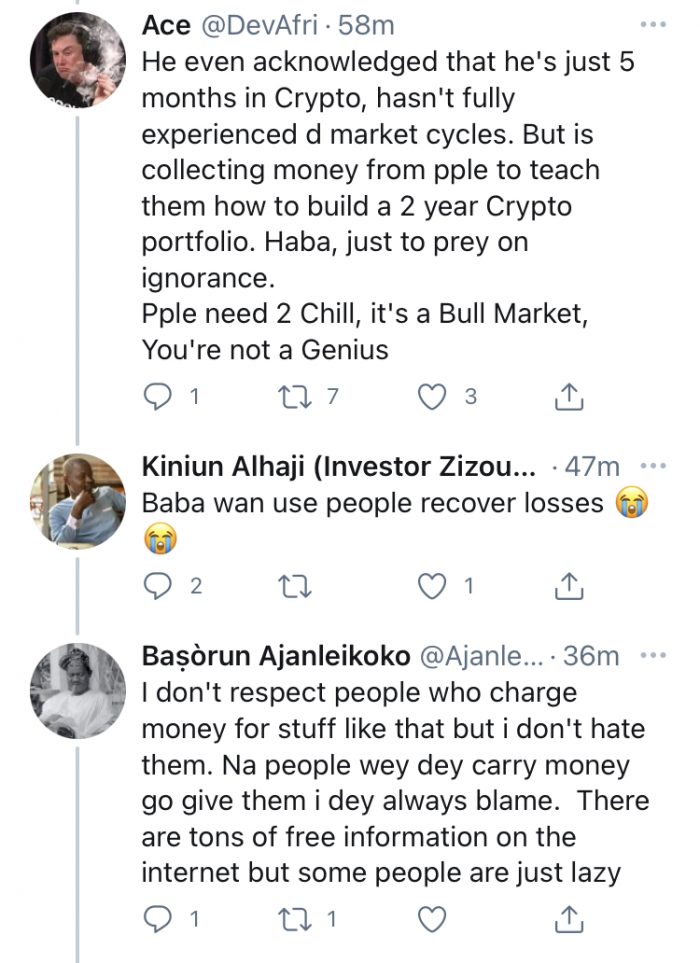
This comment is an example of “I don’t trust his judgement enough to deliver”. And that’s fine. However, what’s not fair is to assume because you don’t trust the judgement, others shouldn’t as well. No, it doesn’t work that way. Even in the same class where I didn’t get value, others got value for their money. Life is more contextual than being that general while “scolding” someone (a stranger) on the internet.
Like I mentioned about “The Browser”, I couldn’t afford to become a paid reader and it stayed that way. Many people won’t even see the value of such curation. But those who see it and can afford it pay for it. That’s all that matters to the creators and I hope a lot more creators will have the muscle to focus on those who matter, those who choose to trust us.
“Don’t pay attention to the mainstream’s opinion of what you’re doing—whether it’s your skills, your idea or whatever. Unless they’re your users, their opinion doesn’t matter. (Pay a lot of attention to your users’ opinions though!)” – Jessica Livingstone
But why don’t we want people to get paid?
I think that’s a wrong question. From all the comments that I saw, nothing pointed to the fact that we don’t want others to get paid, rather we want to choose what they can get paid for. They are not the ones to choose what they want to get paid for. Some of us must approve it.
I understand where this logic is coming from. Some of us want to protect the innocent who could have gotten the information for free online and some of us just wish the community spirit of “freely have you received, freely you should give” to continue.
But deep down, I see two other factors at play. Mimetic desires and economic hardship.
Mimetic was a concept developed by René Girard and popularized by Peter Thiel. “We desire things not because we want them, but because others have them”. We feel the exclusion. We wonder what’s this person saying that he’s charging this much for? Can’t he just make it available to everyone with no one excluded? This gets intensified as often as the creator shares success stories and makes more sales.
PS: This a theory and since it’s not backed by any fact, it can be freely dismissed without facts as well. So just take it as a conjecture from me.
The other is economic hardship. I don’t think we don’t want to pay $150 for a course. I think we cannot just afford it and wonder if anyone ever could. How can you pay N100k for just a course some of us think.
I also think the same. But it is not for the $100 – $200 courses. It’s for the $1,000 courses. I was talking about how some Americans charge $1,000 for online courses. That’s like N500k in Naira. I wouldn’t pay for that (now). But what I won’t also do is to cancel them. Simple, my problem is that I can’t afford it. For the creator of the course, that’s the value they have attached to their work. So I simply just “park well” and face my business and aspire to someday be able to afford it. Don’t cancel.
As the reply to my tweet noted. They are sometimes worth the value. If they are, then my economic situation is the problem, not the course creators.
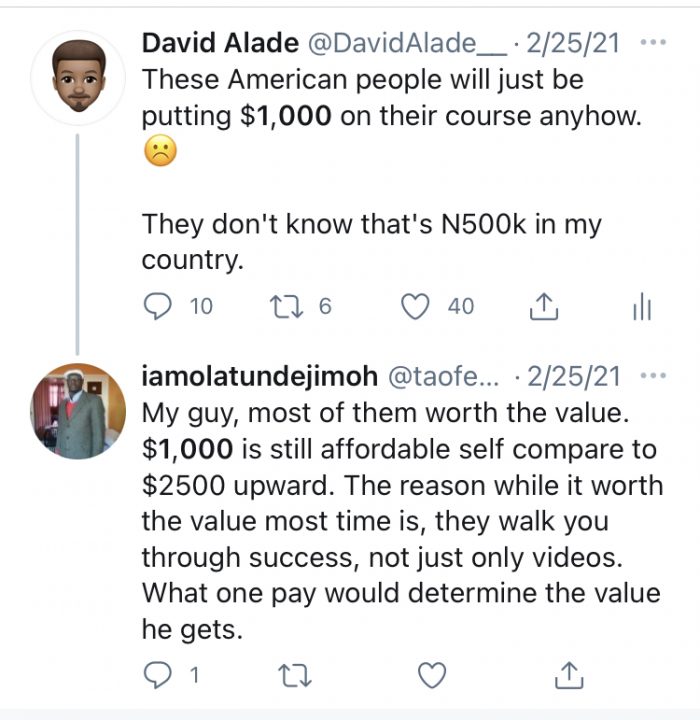
These few points I have concluded as the reason why we sometimes come at people who choose to charge for their knowledge.
A word for the creator
I really want the words of Jessica to sink into your ears. Although she said those word while talking about startups, it is just as much applicable to you.
“Don’t pay attention to the mainstream’s opinion of what you’re doing—whether it’s your skills, your idea or whatever. Unless they’re your users, their opinion doesn’t matter. (Pay a lot of attention to your users’ opinions though!)” – Jessica Livingstone
Focus on those who trust you, don’t assume because you’ve read this, the criticism will stop. These are merely my thoughts not that of 7 billion people on earth. So expect more people to question you including those that you’ve provided value to. But don’t be swayed. You are doing important work and you deserve all that you get from it and even more. Focus exclusively on creating value. You will arrive.
Also, seek more innovative ways to capture all the value that you are creating. Don’t be like Clubhouse. You have written a book, create a course out of it, set up a community around the book, create a consulting practice of it. Do all that you can to capture as much value. It’s your hustle and your responsibility is to your “1,000 true fans”, not to those who criticize you. Respond to them if you wish, but don’t let them cancel you.

